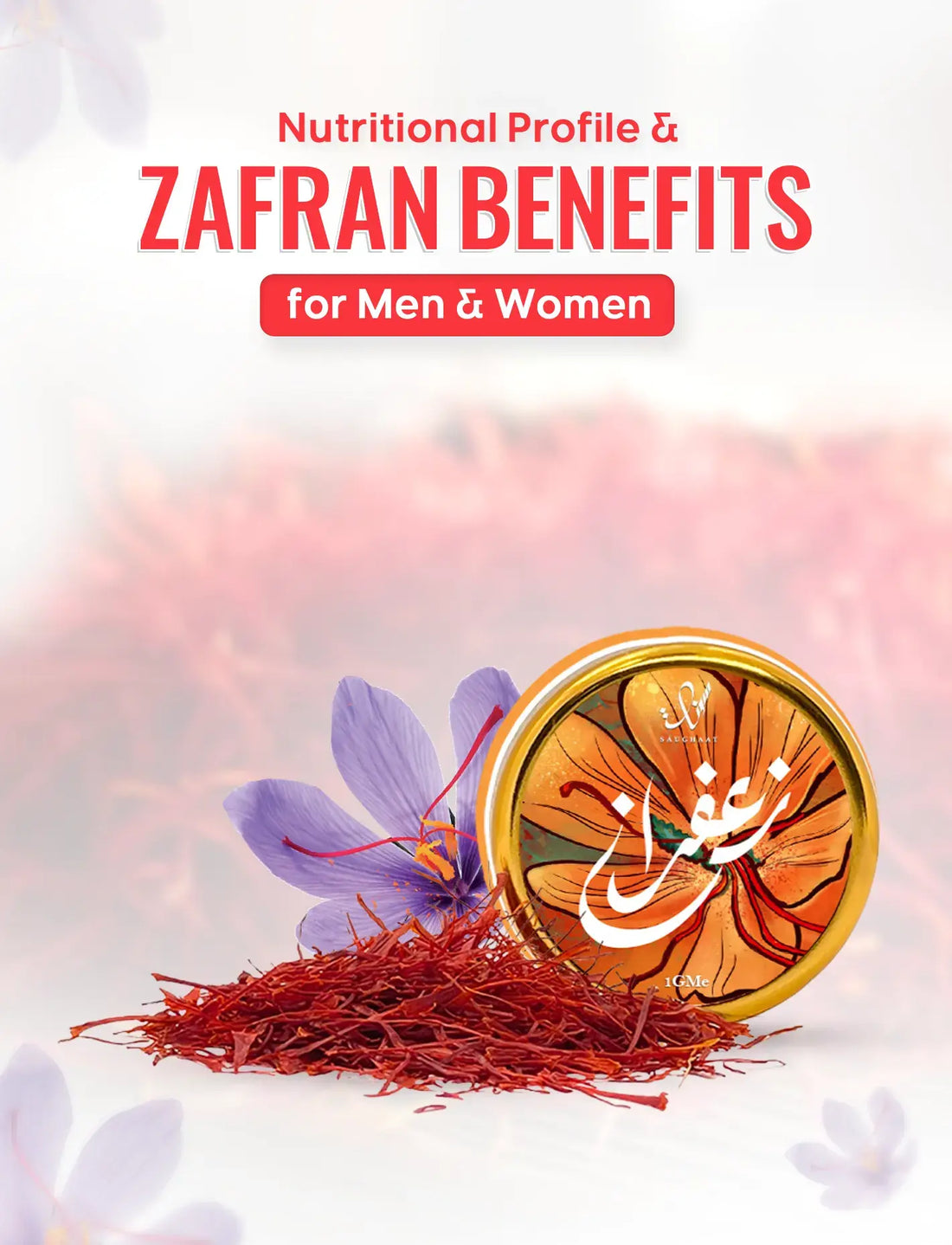
Nutritional Profile and Zafran Benefits for Men and Women
Share
Zafran in English is also known as saffron. It is a valuable spice that has captivated cultures and kitchens for centuries. Originating from the flower Crocus sativus, it boasts a rich history, entwined with culinary, cultural, and medicinal significance. The nutritional composition is described below to create better understanding of zafran benefits.

Nutritional Benefits of Zafran
-
Rich in Essential Vitamins and Minerals
Zafran contains a wealth of vitamins and minerals vital for overall health. It is a good source of vitamin A, vitamin C, and various B-complex vitamins. Additionally, it provides essential minerals such as potassium, manganese, iron, and copper, all playing crucial roles in bodily functions.
-
Antioxidant Properties
One of the standout features of saffron is its potent antioxidant properties. The presence of compounds like crocin, crocetin, and safranal makes saffron a formidable antioxidant. These antioxidants help neutralize free radicals in the body, offering protection against oxidative stress and potential damage to cells.
-
Low in Calories, High in Nutrients
It is a low-calorie spice, making it a healthy addition to various dishes. It adds flavor without significantly contributing to the overall caloric content of a meal. This characteristic makes it an excellent choice for those aiming to manage their calorie intake while still enjoying flavorful cuisine.
Two tablespoons of saffron threads contains
- Calories 13
- Carbohydrates: 2.74g
- Manganese : 1.19mg
- Protein : 0.48g
- Vitamin C : 3.4mg
- Fat : 0.25g
- Fiber : 0.16g
General Zafran Benefits
- It has demonstrated anti-inflammatory effects, potentially reducing inflammation in the body. This property is attributed to compounds like crocetin, which may help alleviate conditions associated with inflammation.
- Studies suggest that zafran benefits in mood-enhancing. It is believed to influence serotonin levels, contributing to feelings of well-being and potentially aiding in the management of mood disorders.
- The presence of antioxidants in zafran may have neuroprotective effects. Research indicates that saffron consumption could positively impact cognitive function and protect against age-related cognitive decline.
- There is limited scientific evidence linking saffron directly to improved sleep. Saffron has been traditionally used in some cultures for its calming properties, but more research is needed to establish a clear connection between saffron consumption and sleep improvement.
- Some studies suggest that saffron may have potential antidepressant and anxiolytic (anxiety-reducing) effects. However, further research is required to fully understand the extent of these benefits and their applicability in mental health treatment.
- Saffron has been explored for its potential benefits in eye health, particularly in conditions like age-related macular degeneration (AMD). The presence of antioxidants in saffron, such as crocin and crocetin, has been studied for their protective effects on the retina. However, more research is needed to confirm and establish the efficacy of saffron in addressing specific eye conditions.
Zafran Benefits for Men
- Early studies suggest that crocetin, a chemical compound in saffron, may play a role in reducing fatigue during exercise, thereby enhancing athletic performance. The mechanisms behind this potential benefit are still under investigation, but the initial findings are promising for individuals looking to improve their stamina and endurance.
- Some research indicates that saffron might have a positive impact on erectile function. It is suggested that saffron could reduce instances of erectile dysfunction and improve both the frequency and duration of erections in men. This aspect of saffron's potential benefits is particularly relevant for those seeking natural remedies for intimate health concerns.
- Another area of interest is male fertility. Studies suggest that saffron might enhance sperm function in men. While research in this area has been inconsistent, there is evidence pointing towards a potential positive influence on male reproductive health.
Zafran Benefits for Women
-
Menstrual Cramps:
-
Mood Regulation:
-
Pain Relief:
-
Antioxidant Effects:
-
Regulating Hormones:

Use of Zafran
It has a long history of use in traditional medicine. Its medicinal properties have been recognized for centuries, with applications ranging from treating respiratory conditions to digestive issues. While traditional uses are respected, it's crucial to consult with healthcare professionals for specific health concerns.
Possible Risks and Side Effects
Consuming it orally as a medicinal treatment for up to six weeks is considered safe. Some possible side effects can include nausea, dizziness, and in extreme cases, toxicity. It's important to adhere to recommended serving sizes and consult a healthcare professional if considering saffron supplements.
Price Range
Zafran price in Pakistan can vary based on factors such as quality, grade, and market conditions. As prices are subjected to change due to fluctuations in supply and demand. Its price in Pakistan per gram ranges between Rs.680 to Rs. 850. At Saughaat, a well known herbal brand you can find the best quality 2g Zafran in Pakistan at Rs.1,400.
Tips for Consuming Zafran
- Add saffron threads into baked goods for the aromatic goodness.
- You can add zafran to marinate meat, poultry and fish.
- Try to incorporate saffron in milk-based desserts, like pudding, panna cotta, milk cake and ice cream.
- Saffron gives a fantastic aroma to the grain recipes like pilaf and biryanis.
- You can also add to a variety of beverages to make it royal and chic. Add it warm cardamom milk or water and let them leave to impart a strong hue.
Conclusion
Zafran is a bright red colored spice that contains highly nutritive compounds, such as antioxidants, vitamins and minerals. Zafran offers numerous health benefits such as treating asthma, whooping cough, anxiety ,protecting eye health, and insomnia. It also aids in controlling menstrual cramps and supports men's reproductive health. While generally safe, but individuals with specific health concerns should consult their physician before using it.
